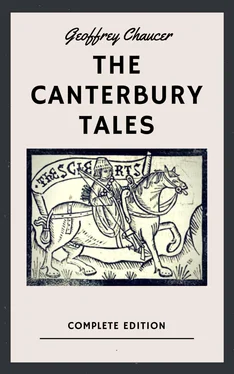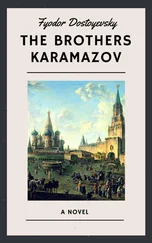That ilke* fruit is ever longer werse, *same
Till it be rotten *in mullok or in stre*. *on the ground or in straw*
We olde men, I dread, so fare we;
Till we be rotten, can we not be ripe;
We hop* away, while that the world will pipe; *dance
For in our will there sticketh aye a nail,
To have an hoary head and a green tail,
As hath a leek; for though our might be gone,
Our will desireth folly ever-in-one*: *continually
For when we may not do, then will we speak,
Yet in our ashes cold does fire reek.* *smoke<4>
Four gledes* have we, which I shall devise**, *coals ** describe
Vaunting, and lying, anger, covetise*. *covetousness
These foure sparks belongen unto eld.
Our olde limbes well may be unweld*, *unwieldy
But will shall never fail us, that is sooth.
And yet have I alway a coltes tooth,<5>
As many a year as it is passed and gone
Since that my tap of life began to run;
For sickerly*, when I was born, anon *certainly
Death drew the tap of life, and let it gon:
And ever since hath so the tap y-run,
Till that almost all empty is the tun.
The stream of life now droppeth on the chimb.<6>
The silly tongue well may ring and chime
Of wretchedness, that passed is full yore*: *long
With olde folk, save dotage, is no more. <7>
When that our Host had heard this sermoning,
He gan to speak as lordly as a king,
And said; "To what amounteth all this wit?
What? shall we speak all day of holy writ?
The devil made a Reeve for to preach,
As of a souter* a shipman, or a leach**. *cobbler <8>
Say forth thy tale, and tarry not the time: **surgeon <9>
Lo here is Deptford, and 'tis half past prime:<10>
Lo Greenwich, where many a shrew is in.
It were high time thy tale to begin."
"Now, sirs," quoth then this Osewold the Reeve,
I pray you all that none of you do grieve,
Though I answer, and somewhat set his hove*, *hood <11>
For lawful is *force off with force to shove.* *to repel force
This drunken miller hath y-told us here by force*
How that beguiled was a carpentere,
Paraventure* in scorn, for I am one: *perhaps
And, by your leave, I shall him quite anon.
Right in his churlish termes will I speak,
I pray to God his necke might to-break.
He can well in mine eye see a stalk,
But in his own he cannot see a balk."<12>
Notes to the Prologue to the Reeves Tale.
1. "With blearing of a proude miller's eye": dimming his eye; playing off a joke on him.
2. "Me list not play for age": age takes away my zest for drollery.
3. The medlar, the fruit of the mespilus tree, is only edible when rotten.
4. Yet in our ashes cold does fire reek: "ev'n in our ashes live their wonted fires."
5. A colt's tooth; a wanton humour, a relish for pleasure.
6. Chimb: The rim of a barrel where the staves project beyond the head.
7. With olde folk, save dotage, is no more: Dotage is all that is left them; that is, they can only dwell fondly, dote, on the past.
8. Souter: cobbler; Scottice, "sutor;"' from Latin, "suere," to sew.
9. "Ex sutore medicus" (a surgeon from a cobbler) and "ex sutore nauclerus" (a seaman or pilot from a cobbler) were both proverbial expressions in the Middle Ages.
10. Half past prime: half-way between prime and tierce; about half-past seven in the morning.
11. Set his hove; like "set their caps;" as in the description of the Manciple in the Prologue, who "set their aller cap". "Hove" or "houfe," means "hood;" and the phrase signifies to be even with, outwit.
12. The illustration of the mote and the beam, from Matthew.
THE TALE.<1>
At Trompington, not far from Cantebrig,* *Cambridge
There goes a brook, and over that a brig,
Upon the whiche brook there stands a mill:
And this is *very sooth* that I you tell. *complete truth*
A miller was there dwelling many a day,
As any peacock he was proud and gay:
Pipen he could, and fish, and nettes bete*, *prepare
And turne cups, and wrestle well, and shete*. *shoot
Aye by his belt he bare a long pavade*, *poniard
And of his sword full trenchant was the blade.
A jolly popper* bare he in his pouch; *dagger
There was no man for peril durst him touch.
A Sheffield whittle* bare he in his hose. *small knife
Round was his face, and camuse* was his nose. *flat <2>
As pilled* as an ape's was his skull. *peeled, bald.
He was a market-beter* at the full. *brawler
There durste no wight hand upon him legge*, *lay
That he ne swore anon he should abegge*. *suffer the penalty
A thief he was, for sooth, of corn and meal,
And that a sly, and used well to steal.
His name was *hoten deinous Simekin* *called "Disdainful Simkin"*
A wife he hadde, come of noble kin:
The parson of the town her father was.
With her he gave full many a pan of brass,
For that Simkin should in his blood ally.
She was y-foster'd in a nunnery:
For Simkin woulde no wife, as he said,
But she were well y-nourish'd, and a maid,
To saven his estate and yeomanry:
And she was proud, and pert as is a pie*. *magpie
A full fair sight it was to see them two;
On holy days before her would he go
With his tippet* y-bound about his head; *hood
And she came after in a gite* of red, *gown <3>
And Simkin hadde hosen of the same.
There durste no wight call her aught but Dame:
None was so hardy, walking by that way,
That with her either durste *rage or play*, *use freedom*
*But if* he would be slain by Simekin *unless
With pavade, or with knife, or bodekin.
For jealous folk be per'lous evermo':
Algate* they would their wives *wende so*. *unless *so behave*
And eke for she was somewhat smutterlich*, *dirty
She was as dign* as water in a ditch, *nasty
And all so full of hoker*, and bismare**. *ill-nature **abusive speech
Her thoughte that a lady should her spare*, *not judge her hardly
What for her kindred, and her nortelrie* *nurturing, education
That she had learned in the nunnery.
One daughter hadde they betwixt them two
Of twenty year, withouten any mo,
Saving a child that was of half year age,
In cradle it lay, and was a proper page.* *boy
This wenche thick and well y-growen was,
With camuse* nose, and eyen gray as glass; *flat
With buttocks broad, and breastes round and high;
But right fair was her hair, I will not lie.
The parson of the town, for she was fair,
In purpose was to make of her his heir
Both of his chattels and his messuage,
And *strange he made it* of her marriage. *he made it a matter
His purpose was for to bestow her high of difficulty*
Into some worthy blood of ancestry.
For holy Church's good may be dispended* *spent
On holy Church's blood that is descended.
Therefore he would his holy blood honour
Though that he holy Churche should devour.
Great soken* hath this miller, out of doubt, *toll taken for grinding
With wheat and malt, of all the land about;
And namely* there was a great college *especially
Men call the Soler Hall at Cantebrege,<4>
There was their wheat and eke their malt y-ground.
And on a day it happed in a stound*, *suddenly
Sick lay the manciple* of a malady, *steward <5>
Men *weened wisly* that he shoulde die. *thought certainly*
For which this miller stole both meal and corn
An hundred times more than beforn.
For theretofore he stole but courteously,
But now he was a thief outrageously.
Читать дальше












